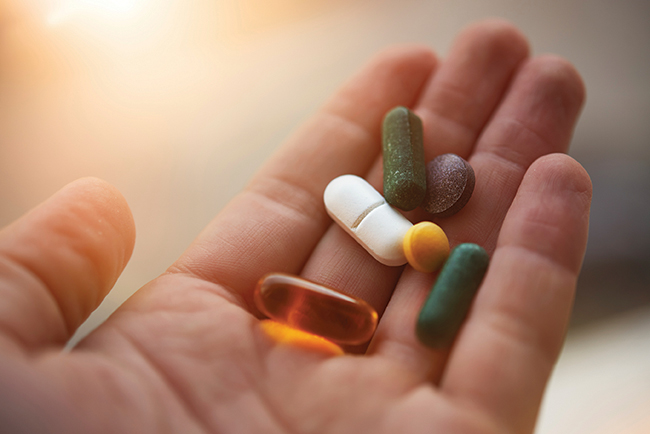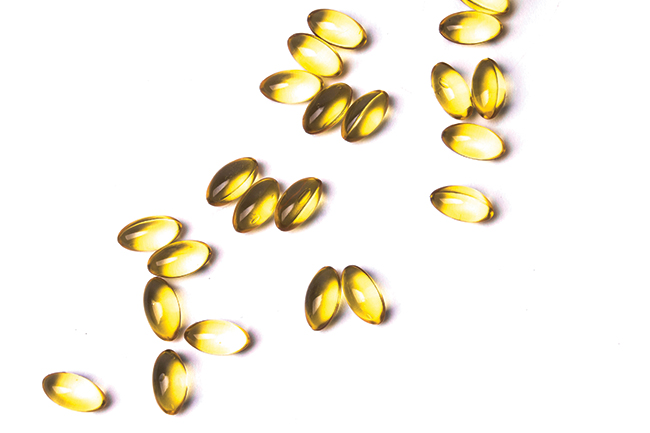Michelle Kickham examines the hype behind supplements; which ones are useful and which we should ignore…

If you’ve ever stood dazed and confused in front of the supplements shelf at your local health food store thinking ‘What are all of these for’, then you’re not alone. There are literally hundreds of different supplements out there – and as more become available the more confused we all get. We will inevitably lose faith in the supplement industry altogether with the outpouring of completely ridiculous products because, really, do you need to buy a bottle of deer antler spray (no, I’m not kidding – this is a real product!).
As a scientist, I am naturally sceptical of any supplement and its apparently magical qualities. However, there are many supplements out there with great health benefits if you need them. If you’re reading this magazine, chances are you have some sort of dietary restriction and therefore you may benefit from some of the supplements I’ve listed below. Nothing can beat a healthy diet and you cannot buy health in a bottle of tablets. I’ve put together a quick overview of some of the supplements I consider to be beneficial – and I am not saying you should take all of these – but some are very useful for those with specific requirements. So here’s my list of the supplements…
MULTIVITAMIN
In my opinion nothing beats a good quality multivitamin. I like to think of them as a ‘safety blanket’ to ensure I’m providing my body with adequate doses of required micronutrients. If you eat ‘perfectly’ and are under no dietary restrictions they aren’t really necessary. But who fits this description? Not many people! Why are they useful? The vitamins and minerals contribute to the overall well-being of your immune system, nervous system and endocrine system (hormones – and we all want those kept in check!). A good quality multivitamin will provide you with all of the vitamins and minerals your body needs to function at its optimum level.
OMEGA 3 OILS
This is my number one supplement I honestly believe everybody should take – especially those with a family history of heart problems, or those who are very physically active. You may know of their ‘brain-boosting’ effects thanks to EPA and DHA (brain food!), which helps regulate dopamine levels, neuronal maintenance and blood flow within the brain, but there’s more to these fats than you think. Omega 3s help the prevention of thrombosis (blood clots), arrhythmias and the development of fatty deposits within heart tissue (fibrosis). In addition, they play a pivotal role in regulating the HDL levels (the bad cholesterol) and LDL (the good cholesterol) in the bloodstream.
Studies have shown that those supplementing with Omega 3s were markedly less likely to suffer with heart attacks and strokes. Omega 3s aren’t only for the heart though, they are also powerful anti-inflammatories, making them a great supplement choice for any athlete.

B COMPLEX
The number one supplement for vegans or those avoiding meat is definitely the B complex. B complexes contain all eight B vitamins and these guys are powerful little vitamins. They’re vital for the conversion of energy from food into fuel for our bodies and also play important roles in regulating mood/stress and immunity. These are a great supplement to take if you have been feeling run down, stressed or fatigued. I used to take these during my college exams (which, thankfully, are now in the past!) and when I’m feeling a little under the weather.
PROBIOTICS
Probiotics – the ‘friendly bacteria’ we all hear about. Whether you supplement with them or not you can be sure that there’s a whole family of bacteria shacking up in your tummy. The ‘good bacteria’ in our gut not only aids in the digestion of food, but also produces antibiotics against dangerous bacteria (they’re like our own little doctors!). While it’s not really necessary to supplement with a probiotic daily, there are times when they can be quite beneficial. Taking a course of probiotics following treatment with antibiotics is a great way to kick start your recovery from an infection. Frequent flyers or those that travel a lot may benefit from probiotics as it can help maintain the balance between the ‘good’ and ‘bad’ bacteria – which is often upset by different environments (ie travelling abroad). They also aid in suppressing the symptoms of digestive issues such as bloating, diarrhoea and cramping.
DIGESTIVE ENZYMES
Digestive enzymes can be helpful on occasion. Digestive enzymes help with the breakdown of food we ingest, allowing for optimal absorption of the nutrients contained within them. Our bodies naturally produce the enzymes required to break down the food we eat and supplementing with additional enzymes can make our bodies become lazy at producing them itself. However, for those with digestion issues due to medication or illness – or for that night where you thought ‘to hell with this diet’ – they’re handy to have around.
SPIRULINA
Out of all of the ‘superfoods’ we hear about nowadays, Spirulina is one worth mentioning as it actually is one heck of a superfood. While you might hear about its incredible 60% protein content – a serving (maximum 10g) contains only 6g of protein which isn’t that much. However, it’s a potent source of nutrients such as phycocyanobilin, which has both antioxidant and anti-inflammatory effects, and B vitamins (especially B12 – a common vitamin deficiency seen in the population). Many studies have shown that it can help lower LDL cholesterol, regulate blood pressure and detoxify heavy metals from the body, although more research is needed to confirm these claims. Nonetheless, if you’re looking for a superfood to try this is your guy. I warn you though, it tastes like what I imagine fishtank water would taste like, so don’t add it to smoothies – no matter how hardcore it makes you feel. Take it as a shot and be sure to have a chaser ready!

SPECIALITY SUPPLEMENTS
In addition to the supplements above, there are some that are ideal for certain people with specific lifestyles or for specific age groups. Athletes, or extremely active individuals, may benefit from supplementing with glucosamine and chondroitin, which can help prevent osteoarthritis and joint pain. We all know how important protein is for muscle growth and repair, making protein powders a great supplement choice for those engaged in any sort of physical activity – if you don’t consume enough in your diet that is! Protein isn’t only for the active individuals though. Recent studies have shown that daily consumption of whey protein in the elderly may delay the onset and severity of sarcopenia – a scientific enigma of the progressive loss of muscle mass with increasing age.
WHAT SHOULD I AVOID?
In simple terms – avoid bottles of ‘antioxidants’ or things that claim to ‘detox’ your body. These are generally a complete waste of money. Eat fruit instead! As for diet pills, fat burners (such as raspberry ketones and Garcinia Cambogia) stay far away. Not to mention these ‘diet teas’! Not only do they not work, some can be dangerous and even cause heart damage.
TAKE HOME MESSAGE
At the end of the day nothing beats a healthy diet and lifestyle. As I said, you cannot buy health in a bottle, but the incorporation of a few key supplements into your daily regime can help ensure your body is working at its optimum level, and that’s what is important – to be healthy, happy and knowledgeable as to what your body really needs. Respect.
